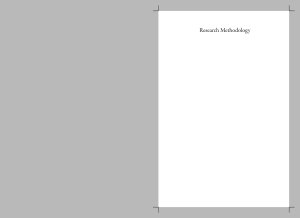Research Methodology: Course Code: 300 – 399 (Elective-1)
About this ebook
Research plays an essential role in the continuous development of educational systems and policies. It provides the foundation for evidence-based decision-making, supports the exploration of new ideas, and promotes an informed and reflective approach to the teaching-learning process. The course outlined in this book covers the key aspects of educational research, ensuring that students are introduced to both theoretical concepts and practical applications that will guide them throughout their academic and professional journeys.
The learning outcomes of this course, as described, aim to empower students with a robust understanding of the concepts surrounding educational research. They will gain knowledge of the various types of educational research—fundamental, applied, and action research—along with the key steps involved in conducting meaningful research. Students will also learn the intricacies of preparing a research proposal, a skill that will be invaluable for their future research endeavors.
The contents of this book are divided into five main units. In Unit-1, we explore the meaning, definitions, characteristics, and objectives of educational research, offering an in-depth understanding of its scope and importance. In Unit-2, we dive into the process of formulating a research proposal, including the development of research questions, objectives, hypotheses, and the use of research tools such as questionnaires, interview schedules, and observation schedules. Unit-3 focuses on the review of related literature, emphasizing its nature, sources, and the critical role it plays in shaping the direction of research. Unit-4 delves into research design, the significance of population and sample selection, and the methods of data collection, organization, analysis, and interpretation. Finally, in Unit-5, we discuss report writing, guiding students through the structure and organization of research reports, which is crucial for presenting their research findings in a clear and professional manner.
This book is designed not only to support students in their coursework but also to inspire a passion for research and inquiry. It is my hope that students, upon completing this course, will not only understand the process of conducting educational research but also develop the critical thinking skills necessary to engage in thoughtful, reflective, and impactful research in the field of education.
The content of this book has been carefully curated to align with the syllabus prescribed by Gauhati University for the 5th semester of the B.A. program, ensuring that the material is both relevant and applicable to the students' academic pursuits. Additionally, I have included practical examples, illustrations, and exercises to further enhance the learning experience and to ensure that students are able to apply theoretical knowledge to real-world situations.
I would like to extend my deepest gratitude to the faculty members of Gauhati University for their support in this endeavor and to the students who will benefit from this book. I sincerely hope that this book serves as a valuable resource for all those seeking to expand their understanding of research methodology in education. May it inspire future researchers, educators, and policymakers to contribute meaningfully to the field of education and to the betterment of society at large.
Khritish Swargiary








